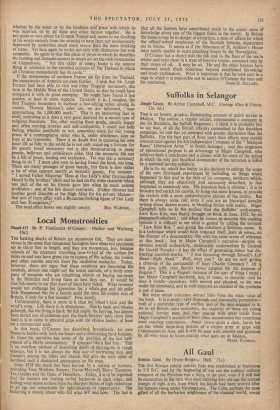Cloistered
A REVIEWER should admit at least some of his limitations or conditions. I am attempting to discuss two books both dealing with the monastic life and I am not a Roman Catholic. It is perhaps for this reason that I find it easier to appreciate the clear, objective and exciting descriptive writing of Mr. Leigh Fermor than the more personal and, to judge from the publisher's notice, more popular work Of Thomas Merton.
Mr. Leigh Fermor's book seems to me admirable of its kind and it is admirably produced, with four decorations by John Craxton. The author describes visits to monasteries in France and also a very different visit to the remains of the rock monasteries of Cappadocia. A foreword and a postscript, both delightfully written, give shape to the book as a whole. Mr. Leigh Fermor is gifted with a clear eye, a keen and enquiring mind. He is always seeing something interesting and he is able to describe not only what he sees but how he feels whilst he is seeing it. Thus one remembers, for example, not only the excellent description of a meal in the refectory of a monastery but also the understandable reaction of the guest newly arrived from Paris. " Inspired probably by Victorian oleographs of monastic life, I had expected a prodigious flow of red wine. The metal jugs on our tables contained, alas, only water." Of this Abbey of St. Wandrille Mr. Leigh Fermor writes very movingly—not quite from the outside, since he is deeply grateful to the monks for their kindness and sympathet:c to them both as human beings and as exemplars of their faith, yet still he is sufficiently detached from them to undertake the journey back to Paris, greatly refreshed in mind and spirit,
whether by the water or by the kindness and grace with which he was received, or by all these and other factors together. He is not quite so sure about La Grande Trappe and seems to me (looking at his words entirely from the outside) to have been not unreasonably depressed by austerities much more severe than the mere drinking of water. Yet here again he writes not only with distinction but with sympathy. So again in that fine piece of prose in which he describes the burning and fantastic scenery in which are set the rock monasteries of Cappadocia. " Yet this valley of empty husks is the nearest thing in existence to the vanished colonies of the Thcbaid in which all Christian monasticism has its roots."
If the monasteries of northern France are far from the Thebaid, the monasteries of America are even further. I wish that Mr. Leigh Fermor had been able to visit one other Trappist monastery, this time in the Middle West of the United States, so that he could have compared it with its great exemplar. He might have found it less austere, at least in some respects. Certainly it is, I imagine, the first Trappist monastery to harbour a best-selling writer among its monks. Thomas Merton's sales are, we are informed, "now approaching the 1,000,000 mark." This is an interesting fact in itself, indicating as it does a very great demand for a certain type of religious literature. Yet, after reading these gentle, usually happy and often moving reveries and self-confessions, I could not help feeling, whether justifiably or not, somewhat sorry for this young priest of a contemplative order who is, under obedience, kept so busy at his typewriter. There is no doubt that in exposing his own inner life so fully to the world he is not only acquiring a fortune for his greatly loved monastery but is also demonstrating to many people, believers and unbelievers alike, that the monastic life can be a life of peace, healing and exaltation. Yet was this a necessary thing to do ? I must also own to having found the book too long. There are many passages of great beauty, but there is also rather a lot of what appears merely as monastic gossip. For instance: " I served Father Macarius' Mass at Our Lady's altar (Immaculate Heart) in the brothers' choir and he had on the white chasuble which was part of the set his friends gave him when he made solemn profession : one of the few decent vestments. (Father Hermes had another good chasuble at the High Altar for his private Masses— that sort of ivory affair with a Byzantine-looking figure of Our Lady and four Evangelists.)"
The total effect leaves one slightly uneasy. Rex WARNER.



































 Previous page
Previous page